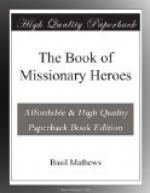As Forder passed a group of Arabs he heard them muttering to one another, “Nisraney[69]—one of the cursed ones—the enemy of Allah!” He remembered that he had been warned that the Arabs of Kaf were fierce, bigoted Moslems who would slay a Christian at sight. But he put on a brave front and went to the Chief’s house. There he sat down with the men on the ground and began to eat with them from a great iron pot a hot, slimy, greasy savoury, and then sipped coffee with them.
“Why have you come here?” they asked him.
“My desire is,” he replied, “to pass on to the Jowf.”
Now the Jowf is the largest town in the Syrian desert—the most important in all Northern Arabia. From there camel caravans go north, south, east, and west. Forder could see how his Arabic New Testaments would be carried from that city to all the camel tracks of Arabia.
“The Jowf is eleven days’ camel ride away there,” they said, pointing to the south-east.
[Illustration: FORDER’S JOURNEY TO THE JOWF.]
“Go back to Orman,” said the Chief, whose name was Mohammed-el-Bady, “it is at your peril that you go forward.”
He sent a servant to bring in the headman of his caravan. “This Nisraney wishes to go with the caravan to the Jowf,” said the Chief. “What do you think of it?”
“If I took a Christian to the Jowf,” replied the caravan leader, “I am afraid Johar the Chief there would kill me for doing such a thing. I cannot do it.”
“Yes,” another said, turning to Forder, “if you ever want to see the Jowf you must turn Moslem, as no Christian would be allowed to live there many days.”
“Well,” said the Chief, closing the discussion, “I will see more about this to-morrow.”
As the men sat smoking round the fire Forder pulled a book out from his pouch. They watched him curiously.
“Can any of you read?” he asked. There were a number who could; so Forder opened the book—which was an Arabic New Testament—at St. John’s Gospel, Chapter III.
“Will you read?” he asked.
So the Arab read in his own language this chapter. As we read the chapter through ourselves it is interesting to wonder which of the verses would be most easily understood by the Arabs. When the Arab who was reading came to the words:
“God so loved the world that He gave His only begotten Son, that whosoever believeth in Him should not perish, but have everlasting life,” Forder talked to them telling what the words meant. They listened very closely and asked many questions. It was all quite new to them.
“Will you give me the book?” asked the Arab who was reading. Forder knew that he would only value it if he bought it, so he sold it to him for some dates, and eight or nine men bought copies from him.
Next day the Chief tried to get other passing Arabs to conduct Forder to the Jowf, but none would take the risk. So at last he lent him two of his own servants to lead him to Ithera—an oasis four hours’ camel ride across the desert. So away they went across the desert and in the late afternoon saw the palms of Ithera.




